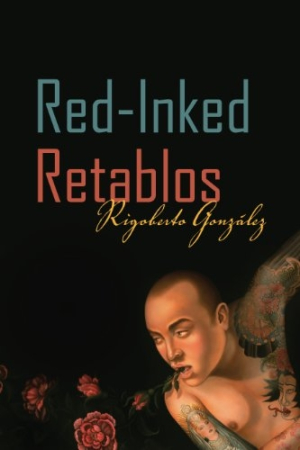Red-Inked Retablos
Rigoberto González will listen to your poem and say, “It’s the most beautiful poem I’ve heard in a long time.” That is, he’ll say it if you’re his Tía Marta or his brother Alex, part of the special group of family and friends who might once again seek him out as “their kindred spirit…to hear what they [have] to say in the special language of personal expression.”
Sometimes a listener, at others a critical reader, González has learned to embrace different roles as the circumstances demand. His various publications demonstrate that he is a poet, a memoirist, a critic, a story writer, and an essayist who writes frankly about personal struggles, pays tribute to established writers who “fought first,” and articulates his hopes for the many communities with whom he is associated—literary, Latino, LGBT, and residents of the American Southwest. In this latest publication, Red-Inked Retablos, González wants to “inspire contemplation,” and he does so with a diverse collection of speeches, tributes, and what he calls “Self-Portraits,” reflections on family and childhood told with notable compassion. Though he’d be the first to tell you he couldn’t have managed an unbiased voice.
González believes that “writing is not a static activity, it is activism.” His most passionate addresses are those directed at other writers, encouraging them to participate, share, and “don’t forget … you are more than ‘just a writer.’” He argues, “We can’t only write the books, we need to talk about them.” True to his words, González acknowledges and ruminates on the work of a number of different artists, and Red-Inked Retablos includes essays of appreciation for the deceased poets Ai and Andrés Montoya, as well as the many writers that inspired him to write and speak out. González is quick to turn the spotlight onto others, and while the discussions remain anchored to the writers’ influence on him, this generosity threatens the coherence of the collection. Readers may find themselves wanting to return to “Self-Portraits” as a means to reconnect with González himself.
Red-Inked Retablos is both reflective and optimistic. By this account, González lives his form of activism, and the essays compiled would be engaging for anyone wanting to see another citizen actively connecting his work and community with his art. Of the many lessons put forth, however, perhaps the most important is the one González learned with respect to his own family’s artistic inspiration: Sometimes as writers and activists—as people—our job is to stand in observance, so that others, when they need it most, might be heard.
Reviewed by
Jennifer Williams
Disclosure: This article is not an endorsement, but a review. The publisher of this book provided free copies of the book to have their book reviewed by a professional reviewer. No fee was paid by the publisher for this review. Foreword Reviews only recommends books that we love. Foreword Magazine, Inc. is disclosing this in accordance with the Federal Trade Commission’s 16 CFR, Part 255.

